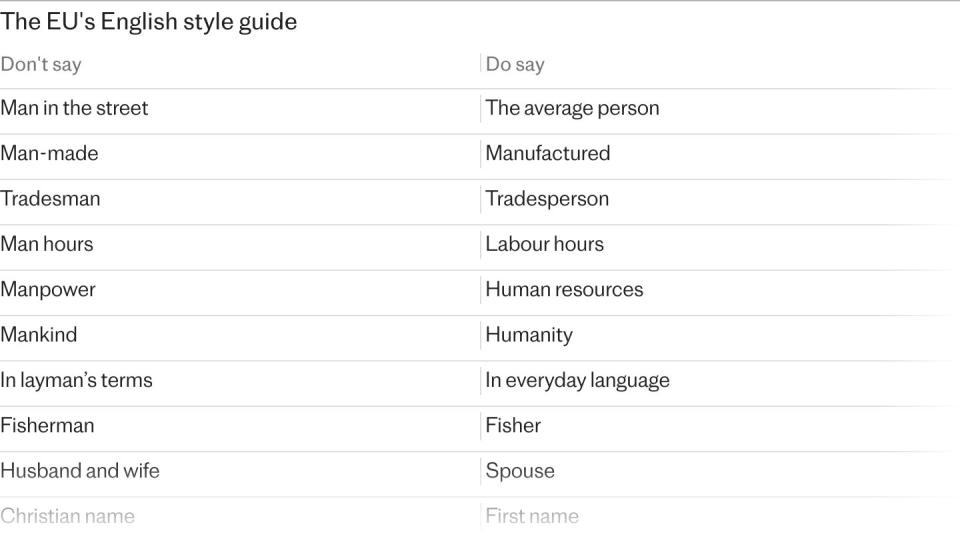The European Union has advised against using a series of common words and phrases that include “man” in the latest version of its English Style Guide.
Politicians, officials and translators are now warned not to use words such as “tradesman” and “man-made” because they are not inclusive, in official guidance from The European Commission, the EU’s executive body.
The new version of the guide, issued in February, also takes aim at the phrase “man in the street”, saying “the average person” should be used instead.
“Wherever possible, use alternatives for terms containing ‘man’ to mean people of all genders,” it explains.
ADVERTISEMENT
The guide was ridiculed by critics.
Lord Young, the founder of the Free Speech Union, told The Telegraph: “This sort of woke nonsense now feels completely outdated. The European Commission clearly hasn’t got the memo. I think JD Vance needs to make another speech.”

Alka Sehgal-Cuthbert, director of campaign group Don’t Divide Us, said: “Ordinary people need the freedom to speak freely in the language which they, and previous generations, have grown up with,” she said.
“Yes, some language changes as society does, but a patronising linguistic putsch by the European Commission is anti-democratic, not inclusive. No HR department should have any truck with this language ‘guide’.”
She added: “That’s why language policing is more than ‘PC gone mad’ and needs active, reasoned rejection, not just eye-rolling disapproval.”
ADVERTISEMENT
Other discouraged words with “man” in the guide include “man hours”, “manpower” and “mankind”, which it is suggested are replaced by “labour hours”, “human resources” and “humanity”.
The common phrase “in layman’s terms” is also singled out for criticism and three alternatives are suggested in its place: “simply put”, “in simple terms” and “in everyday language”.
The guide also argues in favour of the words “chair”, “spokesperson” and “fisher”, instead of “chairman”, “spokesman” and “fisherman”.
Other banned words include “husband” and “wife”, which make way for “spouse” or “partner”, and “Christian name”, which has been replaced by “first name”, “forename” or “given name”.
Guide withdrawn in 2021
A previous version of the guide caused controversy in 2021 because it frowned upon the use of “Christmas” and suggested “holiday season” take its place.
ADVERTISEMENT
The guide was withdrawn just a month after it was first introduced by Helena Dalli, the commissioner for equality.
Matteo Renzi, the former Italian prime minister, praised the document’s withdrawal at the time, saying: “It was an absurd and wrong document. A community is not afraid of its roots. And cultural identity is a value, not a threat.”
In 2024, a 61-page document compiled by the the European Institute for Gender Equality attracted criticism after arguing that “no man’s land” should be replaced with “unclaimed territory”, while “Joe Public” should instead be “average citizen”.
Titled a “Toolkit on Gender-sensitive Communication”, the bundle advised against terms such as “pushy” and “shrill” which “have strong connotations that are strongly associated with only women”.
Instead, the guide, which was first published in February 2019, recommended “assertive” for the former and “high-pitched” for the latter.
ADVERTISEMENT
Meanwhile “virile”, which is considered to be “strongly associated with only men” should be replaced by “strong or energetic”, according to the paper’s authors.
The European Commission declined to comment.
EMEA Tribune is not involved in this news article, it is taken from our partners and or from the News Agencies. Copyright and Credit go to the News Agencies, email news@emeatribune.com Follow our WhatsApp verified Channel



